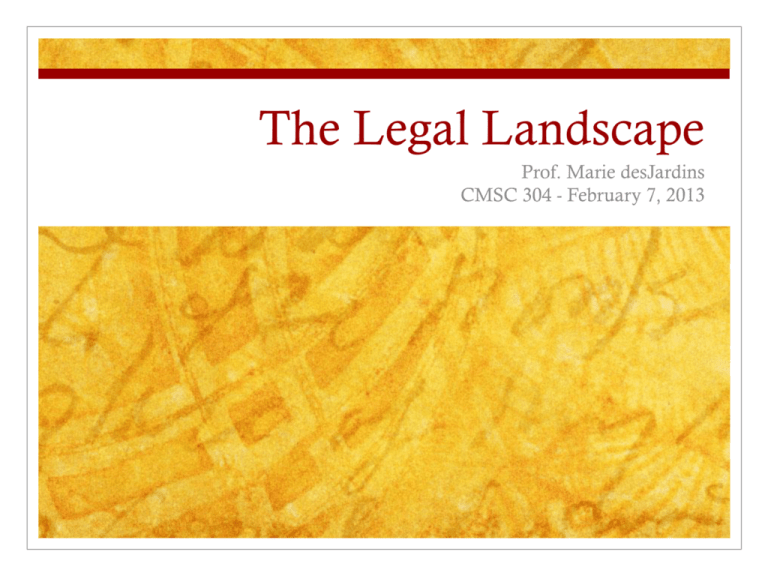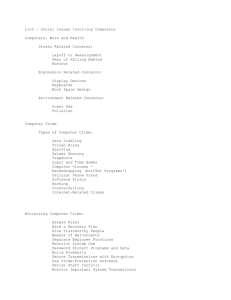
The Legal Landscape
Prof. Marie desJardins
CMSC 304 - February 7, 2013
Overview
Definitions
Review of significant computer laws and cases
A very small sampling of relevant legal law
Only US-level law, but computer law also varies from country to country,
state to state, and sometimes even between municipalities within a state
Group-based reading (one topic per team)
Share back
2
Landmark Laws in
Computing
Murphy’s
Slaw
4
http://www.cartoonstock.com/newscartoons/cartoonists/bve/lowres/bven702l.jpg
Moore’s Law
5
http://letshavetheconversation.blogspot.com/2011/11/moores-law-economics-of-abundance.html
Copyright
“Copyright: the exclusive legal right to reproduce, publish, sell, or
distribute the matter and form of something (as a literary, musical, or
artistic work)” [merriam-webster.com]
Article I, Section 8, U.S. Constitution: Congress shall have the power
“To promote the Progress of Science and useful Arts, by securing for
limited Times to Authors and Inventors the exclusive Right to their
respective Writings and Discoveries...”
A copyright is a statutory monopoly in a work
6
Copyright Basics
You get a copyright by reducing something to a “tangible form” – no
need to file it with anyone.
© 2013 All Rights Reserved
Music, art, books, magazines, dances, baseball play-by-play (without
the express written permission of Major League Baseball)
E-mails, tweets, Facebook postings, snapshots can all be copyrighted
if they are of sufficient length and uniqueness (low standard)
Copyright holder granted a “bundle of rights” – to use, to prevent
use, to copy, display, public performance.
But some “fair uses” may be made
7
Copyright CyberLaw
Digital Millennium Copyright Act (DMCA)
1998 law based on World Intellectual Property Organization treaties
Controversial sections:
“anti-circumvention” – criminalizes the circumvention of access
controls (even if you’re not violating a copyright law!)
Can you jailbreak your own phone, mod your own games, backup
software, or create your own chipsets?
“safe harbors” – protects service providers from being prosecuted or
sued over third-party violations that are hosted on their sites
Stop Online Piracy Act (SOPA)
Would essentially eliminate the “safe harbor” provision of the DMCA
Amid much controversy, was tabled in January 2012
8
Patents
“Patent: a property right granted by the Government of the United
States of America to an inventor ‘to exclude others from making,
using, offering for sale, or selling the invention throughout the United
States or importing the invention into the United States’ for a limited
time in exchange for public disclosure of the invention when the
patent is granted.” [US Patent Technology Office]
A copyright protects the expression of an idea
A patent protects the invention of a process or artifact
Both are forms of “intellectual property”
[US Patent Technology Office] 9http://www.uspto.gov/main/glossary/index.html#p
Trademark
Trademark identifies the provider of goods; Service Mark identifies
the provider of services.
You get a trademark by using it in commerce
Coke, Coca-Cola, font, red color, bottle shape: all trademarked
Many can share the same trademark (Kelly tires, Kelly temps, etc.) as
long as not in same field and no “substantial likelihood of confusion”
What field is Apple in? Apple Computers v. Apple Records – the long and
winding road
You can lose a trademark if it become generic – Jeep, Xerox, Jello
10
Software Patent Law
There isn’t a separate “software patent law”
Software may or may not be patentable, according to existing law
Patent law prohibits patenting “abstract ideas”
You would think that this would prevent patents on software/algorithms
But no...
Famous case: Gottschaik v. Benson – the defendants were not
permitted to patent an algorithm for binary-to-decimal conversion
You would think this pretty much settled it. But no...
Patent trolls cost US businesses $29B in 2011*
* http://www.inc.com/lindsay-blakely/cost-patent-trolls-startups.html
11
Spam and Phishing
“Spam: Noun, A canned meat product made mainly from ham.
Verb, Send the same message indiscriminately to (large numbers of
recipients) on the Internet.” [google definitions]
“Phishing (sometimes called carding or brand spoofing) uses e-mail
messages that purport to come from legitimate businesses that one
might have dealings with.... Typically, they ask for verification of
certain information, such as account numbers and passwords,
allegedly for auditing purposes... [responses] may result in financial
losses, identity theft and other fraudulent activity against them.”
* http://www.computerworld.com/s/article/89096/Phishing
12
Spamalawt [sorry...]
Controlling the Assault of Non-Solicited Pornography and Marketing
(CAN-SPAM) Act of 2003
Whether you approve or not, that’s an awesome acronym!
Establishes requirements for commercial email and authorizes the FTC to
enforce these rules
Mostly ineffective and unforced (gee, ya think?!)
“6 percent of unsolicited e-mail dumped on the Internet in November
[2004] complied with the CAN-SPAM law passed by the U.S. Congress
last year, according to MX Logic...”*
Identity Theft Penalty Enhancement Act (ITPEA)
A much lamer acronym
...it’s such a silly place..
13
Privacy
“Privacy: Invasion of privacy is the intrusion into the personal life of
another, without just cause.... It encompasses workplace monitoring,
Internet privacy, data collection, and other means of disseminating
private information.” [uslegal.com]
Right to privacy stems from:
Fourth Amendment: Protection against excessive, unwarranted
governmental intrusion
Fifth and Fourteenth Amendments: Require “due process” to deprive
anyone of “life, liberty, or property”
There is no explicit statement in the Constitution about an individual’s
right to privacy!
[uslegal.com] http://definitions.uslegal.com/i/invasion-of-privacy
14
Privacy CyberLaw
Alphabet soup:
Wiretap Act (1968 – amended 1986)
Protects wire communications (telephone/telegraph)
Information on the Internet was long considered to be less protected (because it
is passed through and stored on third-party servers)
ECPA (Electronic Communications Privacy Act of 1986)
Protects the security and privacy of stored and transmitted electronic data (and
places limits on government access)
FISA (Foreign Intelligence Surveillance Act of 1978)
FISA authorizes government surveillance of foreign powers and terrorist groups
USA PATRIOT (Uniting and Strengthening America by Providing Appropriate
Tools Required to Intercept and Obstruct Terrorism) Act of 2001
With an acronym like that, how could you go wrong??
Greatly expanded permitted government surveillance (and detention)
15
Computer Crime
“The U.S. Department of Justice (DOJ), in its manual on computer
crime, defines [computer] crime as ‘any violations of criminal law
that involve a knowledge of computer technology for their
perpetration, investigation, or prosecution.’” [uslegal.com]
Three major types of computer crime:
1.
Theft of hardware and software
2.
Attacks on a computer system
3.
The use of a computer to commit a crime
[uslegal.com] http://definitions.uslegal.com/c/computer-crime
16
Computer Crime
What is the “crime” part of computer crime?
Theft
Fraud
Trespass
False Personation
Identity theft/fraud
Is “information” property – U.S. v. Aaron Swartz – “hacked” into MIT
computer and accessed JSTOR files to put online for free.
What is computer trespass? What is “damage?”
What is “access”
What is without authorization – U.S. v. Lori Drew (Myspace suicide case)
17
Cybercrime
First Internet worm:
November 2, 1988
Meant to be harmless – unintended consequences
led to thousands of infected computers and
possibly millions of dollars in damages/costs
Written by Robert Morris
Previously worked for CSEE lecturer
John Park
Prosecuted by Dept. of Justice
First conviction under the Computer Fraud
and Abuse Act of 1984
Prosecuted by then-DoJ attorney and occasional
CSEE adjunct and guest lecturer (and high school buddy of
John Park), Mark Rasch
18
Your Asssignment,
Should You Choose
to Accept It...
What Is the Law Now?
10:30-11:00:
Read the materials I’ve provided on your group’s randomly assigned topic
Identify the key provisions of the laws, or the key findings of the cases
What is permitted? What is prohibited? What are the consequences?
Conversely: What is not permitted? What is not prohibited?
What are your major open questions? (Feel free to dig deeper and look up other
sources if time permits)
11:00-11:15:
Three minutes to share your key provisions/findings (permitted, nonpermitted
behavior and consequences) and open questions
After class:
Share something you learned on Piazza (a link, an insight, a concern, a question)
20
Copyrights
Digital Millennium Copyright Act
http://en.wikipedia.org/wiki/Digital_Millennium_Copyright_Act
http://www.copyright.gov/legislation/pl105-304.pdf
Electronic Frontier Foundation sources:
https://www.eff.org/issues/dmca
Article on jailbreaking and other exemptions:
http://us.practicallaw.com/3-522-0934
SOPA
http://money.cnn.com/2012/01/17/technology/sopa_explained/index.h
tm
H.R. 3261 http://thomas.loc.gov/cgi-bin/bdquery/z?d112:h.r.3261:
21
Software Patents
Gottschaik v. Benson – 409 US 63 (1974)
Richard Stallman speech on misuse of software patents (transcript)
https://supreme.justia.com/cases/federal/us/409/63/case.html
http://www.gnu.org/philosophy/software-patents.html
Article about NewEgg anti-patent-troll case
http://arstechnica.com/tech-policy/2013/01/how-newegg-crushed-theshopping-cart-patent-and-saved-online-retail/
22
Spam and Phishing
CAN-SPAM Act
http://uscode.house.gov/download/pls/15C103.txt
http://en.wikipedia.org/wiki/CAN-SPAM_Act_of_2003
http://en.wikipedia.org/wiki/E-mail_spam
Identity Theft Penalty Enhancement Act (ITPEA)
http://www.justice.gov/criminal/fraud/websites/idtheft.html
http://web5.interliant.com/fsu/cn.nsf/369fe1f2c6e098818525711d00527bff/$FILE/
IDTheftLegis.pdf
23
Wiretapping and Privacy
Wiretap Act
Electronic Communications Privacy Act
http://www.it.ojp.gov/default.aspx?area=privacy&page=1284
https://www.cdt.org/issue/wiretap-ecpa
USA PATRIOT Act
http://www.justice.gov/archive/ll/highlights.htm
24
Cybercrime
Computer Fraud and Abuse Act of 1984
http://en.wikipedia.org/wiki/Computer_Fraud_and_Abuse_Act
http://www.hg.org/computer-crime.html
25





